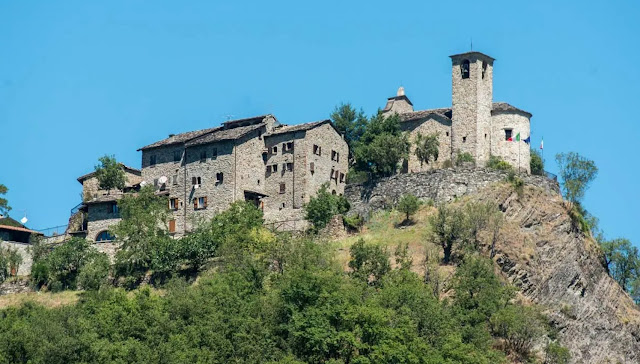It is said that Ernest Hemingway, yes he himself, the Nobel Prize-winning writer with a passion for bullfighting, safaris and boxing, defined Val Trebbia as “the most beautiful valley in the world”.
The sources that confirm this statement are uncertain and are lost in word of mouth that has reached today.
What is certain is that Hemingway really crossed this valley in 1945, as a journalist in the wake of a motorized column of liberation troops and was entranced in front of the landscape of the river that plowed the green slopes, getting lost on the horizon to reach the sea.
Hemingway's Trebbia Valley.
This is an itinerary with the task of making known one of the most surprising scenarios in the whole of Emilia-Romagna, guarded among the green of the Piacentino Apennines.
First step.
Bobbio We start by reaching Bobbio , a town close to the Trebbia river that has retained the appearance of a medieval village, but with the charm of small shops, historic shops, wine bars and restaurants, each to be discovered among the cobbled streets.
And it is precisely by following these city streets that you can reach the Abbey of San Colombano and the Ponte Vecchio.
The first, one of the most important monastic centers in Europe in the Middle Ages, is dedicated to the founding saint, an Irish religious who arrived in Bobbio in the 7th century, in whose Basilica important archaeological finds are preserved, including the saint's sarcophagus.
The second, also called Ponte Gobbo due to the asymmetrical wavy shape with 11 arches, tells the legend that it is the result of San Colombano's cunning towards none other than the Devil … But the visit to Bobbio would not be complete without a stop at the Malaspina Castle, built during the 14th century and stronghold of the Guelphs during the struggles with the Ghibellines of Piacenza.It is worth reaching the top of its imposing tower to enjoy a panoramic view of the city, the Apennines behind it and the valley that opens up after the course of the Trebbia.
From here it is very easy to guess what Hemingway felt when he was for the first time in the presence of the nature of the Apennines.
Gourmet notes: the lunch break is recommended here, it will not be difficult at all to find a restaurant or trattoria where you can enjoy a selection of cold cuts and local dishes, including the original Bobbiesi macaroni, egg pasta and butter, modeled using a knitting needle and topped with stew.
Second step.
The journey to discover the Trebbia Valley continues with a stop in a small village just a few minutes drive from Bobbio: Brugnello, better known as “the Borgo degli Artisti”.
Perched on the top of a rock spur at 464 meters overlooking the Trebbia river, it is a tiny cluster of stone houses whose origins date back to 560.
Today it is inhabited by artists who have contributed to the restoration of houses and streets, hand-carving the shutters of each house, while the recovered stones were used to decorate the alleys and make chairs and benches.
But the real surprise is yet to come: it is the terrace that surrounds the church that offers a privileged observation point of the Trebbia bends, one of the most surprising and unexpected views that can be found.
Third step.
Revive Returning to Piacenza , the village of Rivalta, the suggestive fortified village guarding the Trebbia river, which retains its medieval aspect, is well worth a stop.
The imposing castle around which it stands, one of the most fascinating and best preserved in Emilia, is still today a private home but can be visited, surrounded by a magnificent park.
The Rivalta castle is part of the circuit of the Castles of the Duchy of Parma, Piacenza and Pontremoli








